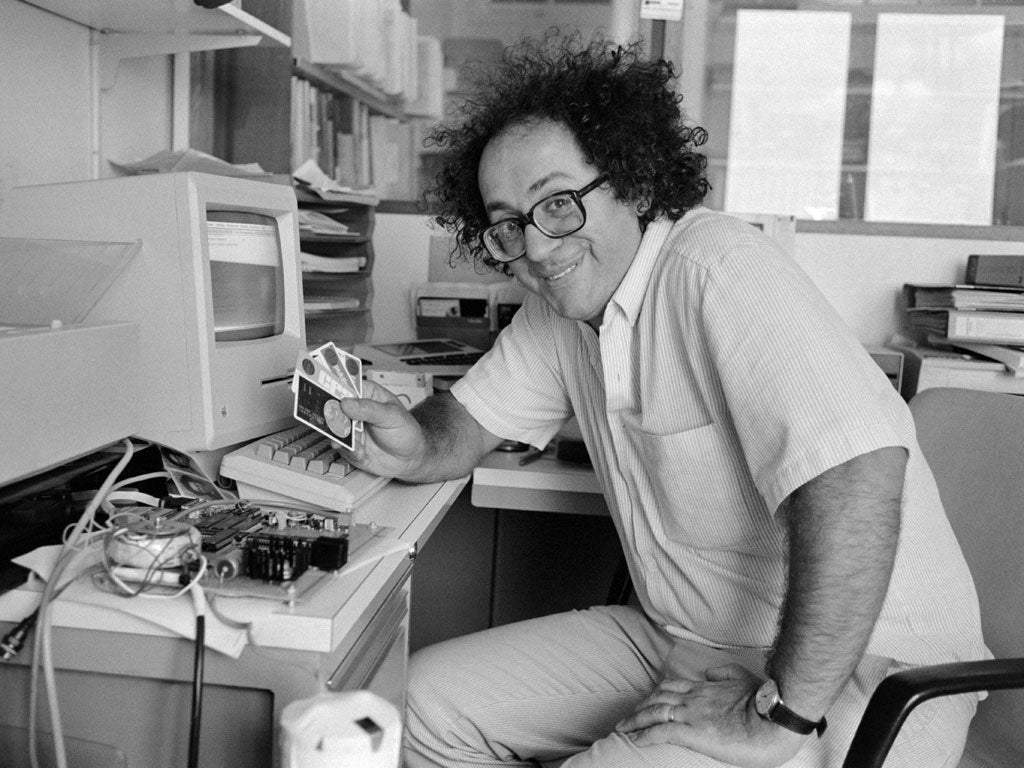Roland Moreno: Inventor who missed out on global recognition for his computer chip smart card
If Moreno had been organised enough, his friends insisted, he could have been ‘the French Bill Gates’

Roland Moreno, born in Egypt but brought up in France, was widely credited with inventing the computer chip smart card now used by banks, supermarkets, filling stations, mobile phone SIM cards, public phone booths, Oyster cards, identity documents and driving licences. Not to mention police or intelligence services, who can use them to trace us. Moreno said he got the idea in a dream but he was the first to admit that his smart cards had downsides as well as upsides. "They have the potential to become Big Brother's little helper," he said.
As often with inventions, there were those who questioned his claim to (what was actually quite limited) fame, mostly restricted to France, where he was declared an Officer of the Legion of Honour in 2009. At the time of his death at the age of 66, most inventors, computer wizards or electronic experts around the world did not know his name. That did not stop him laughing all the way to the bank, wielding his personal chip card, since his company Innovatron has so far made at least £122m in royalties from his invention. Having said that, according to his friends, if he had been "organised," he could have been "a billionaire, the French Bill Gates." Moreno, however, preferred music to money, notably Bach, Mozart and the great French singer/songwriter Boris Vian (author of the classic anti-war song "Le Déserteur").
Two German inventors almost two generations older than Moreno, Jürgen Dethloff and Helmut Gröttrup, had come up with an idea for a plastic card with an integrated circuit in 1969 but it was the geeky, eccentric and surrealistic Moreno – with the frizzy Bob Dylan Blonde on Blonde haircut – who got the first detailed patent through in France on 25 March 1974. "I came up with the idea in my sleep," he told France Soir in 2006. "To be honest, I'm a lazy bum and my productivity is on the feeble side. I'm jealous, spendthrift, a total couch potato and absent-minded – I've got my real Professor Nimbus side" (referring to the absent-minded French cartoon character).
A few years ago Moreno bet a journalist that he could stop anyone on the streets of Paris and they'd be carrying at least three examples of his invention. Apart from a few beggars, a homeless banker who had lost his job and some orange-robed Hare Krishna supporters, he was proved right. He called his card "la carte à puce" (the flea card, because of the miniature chip) and it caught on in France long before anywhere else. Oddly enough, it might have been the smart ring rather than the smart card: he first inserted a microchip into a signet ring on his finger, thinking it could be a modern-day version of the old ring seal stamp of the nobility. We might all now be walking around with smart rings – maybe, one day, we still shall be – but it didn't catch on in the 1970s and so the smart card was born.
A big Woody Allen fan, Moreno code-named his first smart card project TMR – short for Allen's 1969 comedy Take the Money and Run. He later reversed the letters to RMT for his research department at Innovatron. Because of the initial costs to would-be users,a carte à puce was slow to take off. But by the 1980s France had led the way in computer chip smart card technology, starting with its use by the phone company France Télécom in its phone booths from 1983. It is now in operation worldwide, including in London's Oystercards.
Roland Moreno was born to an Egyptian Jewish family, with the surname Bahbout, in Cairo in 1945. The family moved to Paris when Roland was a child and changed the surname to Moreno. He attended the Montaigne and Condorcet schools in the French capital but left school early and liked to say in later life that he had been "self-taught." After school, he worked as a runner, or errand boy, for the magazine L'Express, a cub reporter for Détective magazine and an editor at the chemistry magazine Chimie-Actualités.
After his smart card success he continued to invent, particularly in the field of computerised music, including the now defunct online music station Radio Deliro. He also inspired the "mad inventor" character in several French films including Les Sous-Doués en Vacances (The Under-Gifted on Holiday, 1982) in which a Moreno-like character invents a "Love Computer." Among the many books he published was a cookery book under the pseudonym Laure Dynateur (when pronounced aloud, that sounds exactly ike "l'ordinateur", the French word for computer).
Moreno said one of his ambitions was to see himself as a waxwork in a museum: "It's said that God owes a lot to Johann Sebastian Bach," he said. "I would like it said that French people owe a lot to Moreno."
Roland Moreno, who died in Ile-de-France in Paris, had suffered a pulmonary embolism in 2008.
Roland Bahbout (Roland Moreno), inventor: born Cairo 11 June 1945; married 1976 Stephanie Stolin (divorced, two daughters); died Paris 29 April 2012.
Join our commenting forum
Join thought-provoking conversations, follow other Independent readers and see their replies
Comments
Bookmark popover
Removed from bookmarks